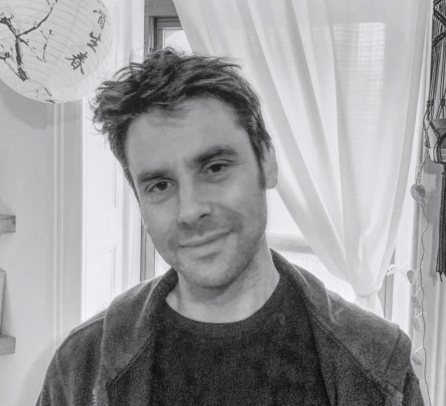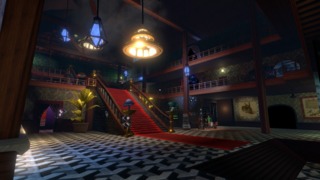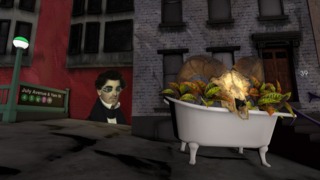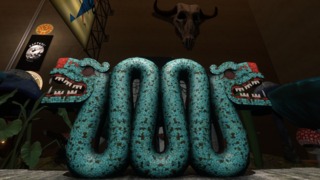Interview: Greg "Cosmo D" Heffernan, Creator of the Off-Peak Games
By gamer_152 2 Comments

A classically-trained cellist, Greg Heffernan graduated from New York University in 2005 with a degree in music composition. Adopting the moniker Cosmo D, he became a passionate contributor to the Brooklyn music scene, playing in bands such as Bing & Ruth and Archie Pelago. Nine years after graduation, Cosmo would reenroll at his alma mater, but this time, to study game design. With his 2014 release Saturn V, he began a line of surreal exploration titles, which now includes Off-Peak, The Norwood Suite, and Betrayal at Club Low. Rearranging his surroundings and experiences into hallucinogenic sandboxes, his games celebrate the artistic communities in his vicinity and dramatise the changes that have reshaped them over time. I picked Cosmo's brain to find out more about how he puts a game together.
____
Gamer_152: The environments in your games do a lot at once. They act as art galleries and practical spaces; they're hub areas and mission zones. How do you go about designing these levels?
Cosmo D: I start broad and hone in. I usually start [with] some grey-boxing in Blender, then go in layer after layer adding lights, textures, details, props over time. It's not unlike moving into a new place in real life. It starts a bit barren, but with time, it becomes more "lived in." I work on my games for a while, so I start to see where I want to add details with repeated visits inside the environment. It's an organic process, like everything else I try to do.
G_152: I know that Robert Yang (of NYU Game Center fame) helped you create more openings in The Norwood Suite levels, light them better, and make them denser. Can you give us some examples of specific changes you made based on his advice?

CD: At first, the foyer of the hotel was a wide open space with mezzanines, like a theatre stage or office atrium. Robert encouraged me to add walls under the stair landings, so the space would be more "broken up." I hadn't thought critically about moving from open to closed spaces and the power of that shift. If everything is open all the time, nothing in particular makes an impact. I think Off-Peak got away with this because it was intentionally maximalist and thematically appropriate for being so. The open/closed passageway stuff came together almost by accident. Yet, even there, I noticed players tended to would drift more to the left side of the station than the right just because there were more bright flashing lights weighted on that side.
In hindsight, I now realise how powerful spatial contrast can be. It's also more practical for rendering and performance, to go from big to small, closed to open, and back. If everything is always visible, it taxes the computer rendering it. Even outdoor environments benefit from markers, lights, etc. if they actively aim to guide the player. You could apply this rule to other artforms, certainly music, and the results would be fruitful. Robert's impact can be felt most strongly in Norwood - he encouraged me to make the space darker, use lights in passageways to guide players, and trust the impact of a small, dense room.
G_152: Your games are known for their diegetic sound. What's the motivation behind your in-level sound sources?
CD: I came to the medium as a music and sound person, so I really just wanted to lean into that as hard as I could. Especially as it pertains to atmosphere and expressing emotions outside of anything communicated directly. I love the classic Looking Glass games that use sound to heighten the experience. It's very much at the foundation of my practice.
G_152: Your games seem to take influence both from the New York jazz and electronic music scenes. How was it moving between one and the other? Are there patterns shared between the genres?

CD: At first, I enjoyed riffing visually in games the way I did sonically in music. But as the process of games became more involved, and I got more skilful with it, I think that process took on a life of its own. Still, I'm a big proponent of finishing things, knowing my goals, and keeping a productive pace, if possible. I applied this approach in music and now do so in games, though at a different pace and scale.
G_152: You perform the soundtracks for your games as part of the music trio Archie Pelago. What does the process for recording those songs look like? How do you convey to the band what you're doing?
CD: The tracks on the original Off-Peak soundtrack were Archie tracks that didn't have a home anywhere else. Every track had its own origin story and there was no set method. Improv, premade drum tracks, synth sketches on the iPhone, live recordings of ice breaking apart. Everything was and is possible - a true free-for-all. After that game was released, we went our separate ways as a band. But since then, I've brought in other instrumentalists.
Myk Freedman read charts for Norwood and Jerome Ellis for Off-Peak City. Novelty Daughter did live wordless singing for Norwood as well. I didn't give them much direction. I just gave them some sketches and encouraged them to be themselves on the microphone. For me, it's always been about letting collaborators be as comfortable and honest as they can be for the project.
G_152: You've mentioned that you were behind the music for some game-related adverts. Can you tell us any adverts specifically you scored for and whether that work differs from other musicianing?

CD: I left that world almost a decade ago, so the ads are probably lost to time, or the music is sitting in a vault somewhere. Still, that work is about deadlines, "hitting the brief," and coming up with convincing tracks that are going to sell both a product and a feeling. It's a bit like solving a puzzle or making a piece of sonic furniture, all under a tight deadline. It helped give me techniques and practices for finishing creative endeavours: pace yourself, scope smart, be ready to pivot, accept that it will often require more work. Inside the sweat-box of the composer's studio, I was in this mindset on a daily basis for years. My games probably wouldn't exist in the state that they do had I not cut my teeth in this environment.
____
Thanks to Cosmo D, and thank you for reading.